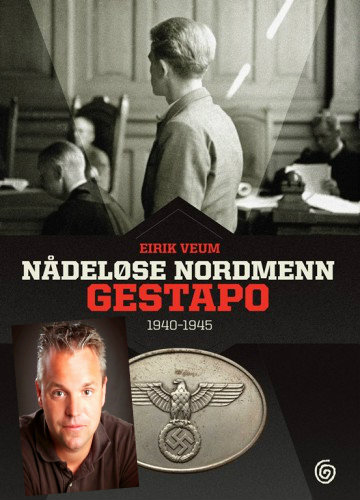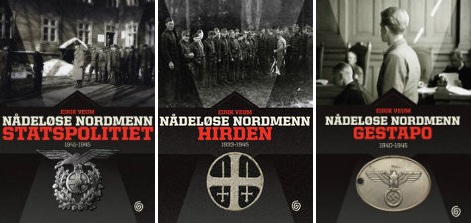Nådeløse Nordmenn:Gestapo, the newest and last book in the trilogy that Norwegian author Eirik Veum wrote faces censure after containing some 1,145 names of Norwegian citizens who, according to Veum, were involved with the Gestapo during the Second World War.
Eirik Veum, in an interview last November 13, said that the country needs to be reminded that evil can be Norwegian, hence, the book. He even added that Norwegians, like other people, are capable of carrying out cruel deeds if the conditions are right.
Eirik Veum is the author behind the trilogy which centers on “ruthless Norwegians”. The first book in this trio of books, entitled Statspolitiet, was released way back in 2012. It centered on the Stapo, more formally known the Norwegian national socialist police force Statspolitiet, and their deeds during WWII.
The second book that Eirik Veum wrote in the trilogy was published last year. It was entitled Hirden and was all about the fascist organization Nasjonal Samling’s (NS), founded by then Minister of Defense Vidkun Quisling, and the war crimes its political troops committed.
Important Informants Revealed

In this latest release, Eirik Veum revealed how Norwegian informants worked for the Gestapo particularly the female ones.
According to him, several of the most successful Gestapo informants during the war were women who, often, were young in age. These young women initiated love affairs with resistance fighters as being in that close relationship with the latter, siphoning important information was easier. Eirik Veum also revealed that most of these Gestapo spies were not tracked until WWII ended.
One of the Gestapo spies he identified in his latest book is Aud Maggi Andersen. Maggi was described by her control officer as some who does her missions with exemplary prudence and exceptional skills in spite of the fact that she only had Folkeskole [public school] education. In fact, said Eirik Veum, Maggi was one of the Gestapo’s most proficient agents.
According to Veum’s book, Maggi started working for the Gestapo when she was 23, using methods like going into love affairs with those who were involved within the resistance movement. Because of these, she was able to uncover a large volume of resistance operations within Oslo area.
Aud Maggi Andersen received a death sentence for her deeds during the war — her only distinction from that of other Norwegian females who worked for the Gestapo. Nevertheless, her sentence was never carried out.
The Supreme Court of the country overturned her sentence and handed down a new decision — she was to undergo a lifetime of forced labor instead. However, after five years of serving her sentence, Aud Maggi Andersen was given a pardon.
Roy Vidar Bernhus, Maggi’s son, thinks no ill of Eirik Veum, nonetheless. Mr. Bernhus believes that his mother’s story needs to be revealed. In an interview, he said that though many don not like Eirik Veum’s writings, he doesn’t see any reason the author shouldn’t tell the stories as they happened during the war.
Rifts and Old Wounds
But if Mr. Bernhus supports Eirik Veum and his books, many have censured them.
One of these is Professor Emeritus Ole Kristian Grimnes from the University of Oslo. having studied war history ever since the 1970s, he criticizes Veum for “making money out of other people’s sufferings” through the publishing of his trilogy.
As the professor pointed out, he is not against Veum writing about the Gestapo as, in fact, the author is a great help when in comes to research in this field. What he is against is the latter writing down names in his books as it obviously reopens old wounds and causes rifts between family members.
Another man, someone Eirik Veum mentioned in his first book, wanted to stop the publication of the author’s trilogy.
According to him, he was against Nazism but was pro-NS as he believes that Vidkun Quisling is a good man. But what he is concerned the most is how Eirik Veum’s books would cause a great fracture in his relationship with his family.
The man admitted that his family did not know the depth of his deeds during the war.
Meanwhile, the author himself, Eirik Veum, conceded that he knew releasing the books would be very controversial. However, he added that none of the surviving Norwegian Statspolitiet he got in contact with showed remorse for what they did.

